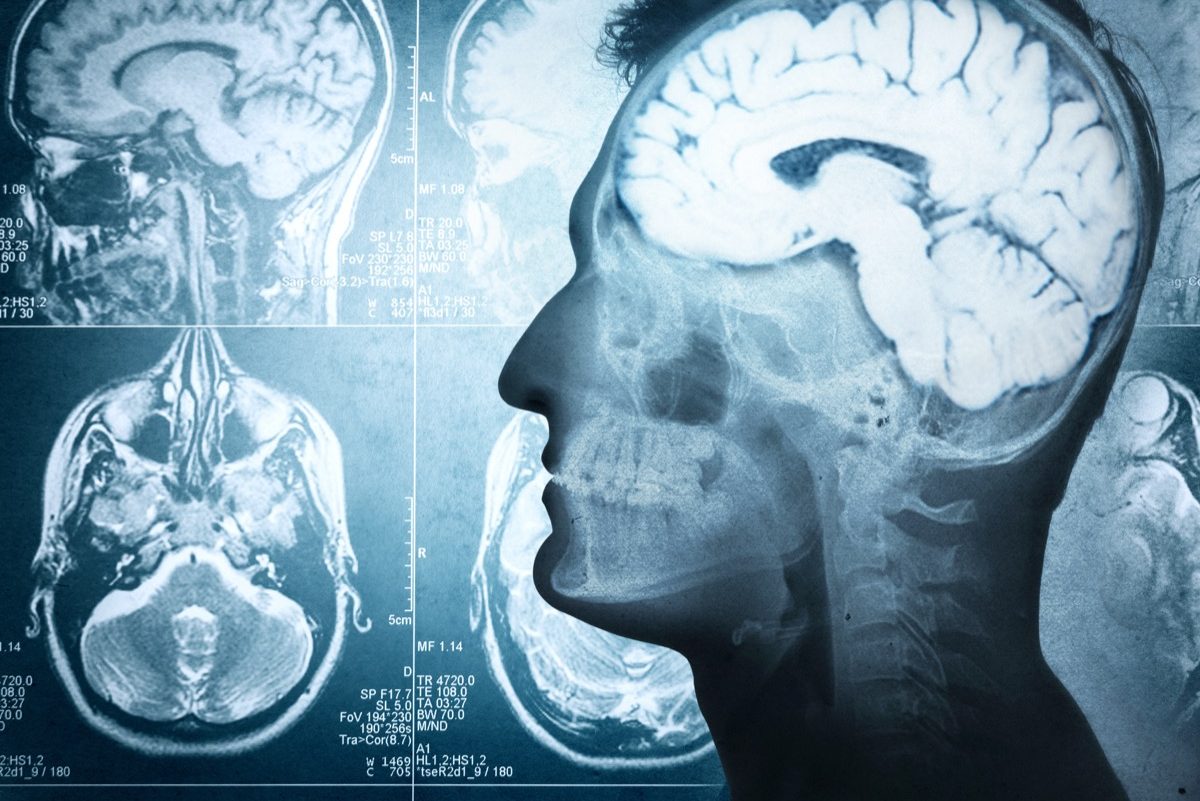Known for her infamous roles in Cruel Intentions (1999), Legally Blonde (2001) and Hellboy (2004), Selma Blair has worked prolifically since the start of her career, but did so with chronic pain. The actress told Variety, "I'd compare myself to people. I didn't understand people didn't hurt every day. I've hurt since I can remember." After suffering years of feeling unwell and enduring several medical procedures, Blair finally understood why. At the age of 46, she was diagnosed with multiple sclerosis and in 2018 she publicly announced her condition. Since then, the now 50-year-old has been very open about MS and recently revealed she's in remission. She told TODAY, "The pain is still there. I'm in remission. I built no new lesions. But I still have some brain damage and things that are there, but I'm OK with it. I'm grateful because I'm doing so much better." Eat This, Not That! Health spoke with Dr. Tomi Mitchell, a Board-Certified Family Physician with Holistic Wellness Strategies who tells us, "Multiple Sclerosis (MS) is a chronic, unpredictable disease of the central nervous system (CNS) that disrupts the flow of information within the brain and between the brain and body. Early and accurate diagnosis of MS is critical because it can help people make informed decisions about their treatment and manage their disease. Below are five symptoms of MS to be aware of and what to know about the condition." Read on—and to ensure your health and the health of others, don't miss these Sure Signs You've Already Had COVID.
Dr. Mitchell says, "Multiple sclerosis (MS) is a chronic, autoimmune disease that attacks the central nervous system (CNS), which includes the brain, spinal cord, and optic nerves. The immune system mistakenly attacks myelin—the fatty substance that covers and protects nerve fibers—as if it were foreign tissue. This damage disrupts communication between the brain and the body and can lead to many symptoms, including muscle weakness, balance problems, vision loss, and changes in sensation. MS is typically diagnosed between 20 and 50; women are about two to three times more likely than men to develop the disease. There is currently no cure for MS, but there are treatments that can help manage symptoms and slow the progression of the disease. With early diagnosis and treatment, people with MS can live long, healthy lives."

"The answer isn't simple, as several risk factors have been identified," Dr. Mitchell says. "Some of these include gender (women are more likely to develop MS than men), age (most people are diagnosed between the ages of 20 and 50), family history (having a first-degree relative with MS increases your risk), genetics (specific genes have been linked to MS), and geography (people who live in northern latitudes are at higher risk). While there is no definitive answer to the question of who is at risk for MS, understanding the various risk factors can help you make informed decisions about your health."

Dr. Mitchell explains, "The cause of MS is unknown, but it's believed to be triggered by a combination of environmental and genetic factors. MS damages myelin—the protective covering around nerve fibers—and causes inflammation. This damage disrupts the flow of information between the brain and the body, leading to a wide range of symptoms that can vary from mild to severe and heat in MS patients. While there is no cure for MS, treatments can help manage symptoms and slow the progression of the disease. Early diagnosis and treatment are critical to preventing long-term disability."

Dr. Mitchell states, "Multiple sclerosis (MS) is a chronic, degenerative disease of the central nervous system that can profoundly impact an individual's overall health and daily life. MS symptoms can range from mild to severe, including problems with muscle control, balance, vision, feeling, and thinking. The disease is unpredictable, and its progression can vary significantly from one person to the next. In general, however, MS tends to progress over time, leading to increased physical disability and cognitive decline. While there is no cure for MS, treatments can help manage symptoms and slow the progression of the disease. With proper treatment and support, many people with MS can lead active, productive lives."

Dr. Mitchell shares, "The main symptoms of MS are fatigue, numbness, weakness, pain, and vertigo. Fatigue is one of the most common and debilitating symptoms of MS. It can be described as feeling tired all the time, even after a good night's sleep. For some people, fatigue is the first symptom of MS. It may come and go or get worse over time. Fatigue can be so severe that it interferes with work, leisure activities, and social interactions. The exact cause of MS-related fatigue is unknown, but it is thought to be due to a combination of physical and psychological factors. Biological factors may include nerve damage, muscle weakness, and problems with blood circulation. Psychological factors such as stress and depression can also contribute to fatigue. There is no cure for MS, but there are treatments that can help manage the symptoms, including fatigue. If you are experiencing fatigue, talk to your doctor about ways to manage it.
MS-related fatigue is often described as an overwhelming sense of tiredness that is not improved by rest. It can be debilitating and significantly impact a person's quality of life."

According to Dr. Mitchell, "Multiple sclerosis (MS) can cause a variety of symptoms, including problems with bladder function. Bladder problems are one of the most common urinary symptoms in people with MS. There are several different ways that MS can affect the bladder, including:
* Reduced sensation in the bladder can lead to a feeling of fullness and an inability to empty the bladder.
* Spasticity in the muscles surrounding the bladder can make it difficult to initiate urination or cause incontinence.
* Nerve damage can interfere with the signals that tell the body when the bladder is full or needs to be emptied.
Bladder problems can be frustrating and embarrassing for people with MS, but the treatments available can help. If you are experiencing difficulty with your urinary function, talk to your doctor about ways to improve your symptoms."

"Bowel problems are a common symptom of MS, including constipation, diarrhea, and incontinence," Dr. Mitchell explains. "MS can cause damage to the nerves that control the muscles involved in bowel movements, which can lead to these problems. In addition, MS can also cause inflammation of the intestine, which can lead to diarrhea. Some people with MS may also have trouble controlling their bowels due to neurogenic bladder, a condition in which the nerve signals that tell the brain when the bladder is full are disrupted. As a result, people with MS may experience episodes of incontinence. While there is no cure for MS, treatments can help manage symptoms and improve quality of life."

Dr. Mitchell says, "Vision problems are some of the most common possible symptoms of multiple sclerosis (MS). More than half of people with MS will experience some form of vision impairment during the disease. There are several potential explanations for why this may be the case. First, the damage that MS causes to the nerves can interfere with transmitting signals from the eyes to the brain. This can lead to problems with vision, such as blurred or double vision.
Additionally, MS can cause inflammation in the optic nerve, which is the nerve that carries information from the eye to the brain. This inflammation can cause swelling and reduce blood flow to the optic nerve, leading to visual problems. Finally, MS can damage the part of the brain that processes visual information. This can lead to a loss of central vision and problems with depth perception and color detection. While there is no cure for MS, treatments can help manage its symptoms, including vision problems. With early diagnosis and treatment, people with MS can often maintain relatively good vision."

Dr. Mitchell states, "Numbness and tingling are common symptoms of multiple sclerosis (MS). They often occur during MS relapses or attacks and can be followed by partial or complete recovery periods. Although MS relapses may vary in intensity, they typically cause temporary numbness, tingling, or weakness in the limbs. While these symptoms can be frightening, it's important to remember that they are usually temporary and that many people with MS ultimately make a full recovery. If you are experiencing numbness, tingling, or weakness in your limbs, it's essential to speak with your doctor so that they can help you manage your symptoms and support your recovery."
The post Signs You May Have MS Like Selma Blair appeared first on Eat This Not That.
----------------
By: Heather Newgen
Title: Signs You May Have MS Like Selma Blair
Sourced From: www.eatthis.com/news-signs-you-may-have-ms-like-selma-blair/
Published Date: Tue, 02 Aug 2022 11:31:23 +0000
Read More
Did you miss our previous article...
https://naturesmart.us/fitness/cholesterollowering-tricks-that-really-work
 HealthWellnessFitnessBeautyVideosPrivacy PolicyTerms And Conditions
HealthWellnessFitnessBeautyVideosPrivacy PolicyTerms And Conditions
